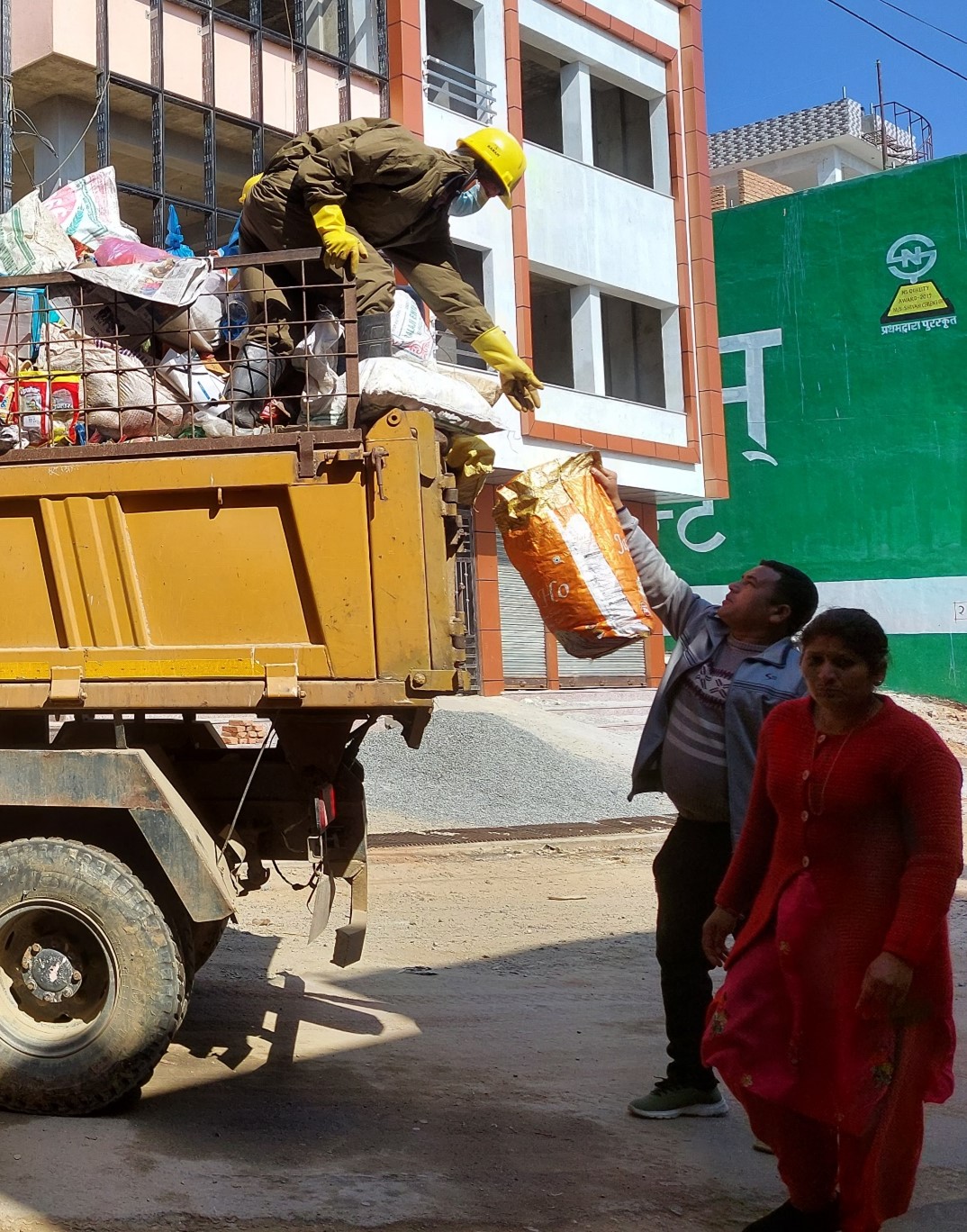Disclaimer:
Please be aware that the content herein has not been peer reviewed. It consists of personal reflections, insights, and learnings of the contributor(s). It may not be exhaustive, nor does it aim to be authoritative knowledge.
Title
Please provide a name for your action learning plan.
Creating Green Jobs through Waste Upcycling at Shankharapur Municipality of Nepal
Challenge statement
Challenge type: If you are working on multiple challenges, please indicate if this is your "big bet" or "exploratory" challenge.
Please note: we ask you to only submit a maximum of 3 challenges - 1x Big Bet, 2x Exploratory. Each challenge must be submitted individually.
BIG BET
Challenge statement: What is your challenge? (Please answer in specific terms: "Our challenge is that...”.)
One of the major challenges in Nepal is the issues related to waste management. In order to contribute to the national priorities, we are focusing on the challenge related to integrated solid waste management contributing to circular economy
Background: What is the history of your challenge? What is causing or driving it? Who is involved? How does the current situation look like? What undesired effects does it produce?
The constitution of Nepal (2015) states the right of every citizen to live in a clean and healthy environment. With federalization, the local governments are given the overall responsibilities to introduce their own environmental and SWM policies and regulations and implement them in partnership modality. Though Nepal has a mandatory policy for waste segregation, implementation mechanism is yet to be effective. The Solid Waste Management Act 2068 (2011) and Rules 2070 (2013) mandates the need of waste segregation at source, separate collection and processing of waste. Nepal’s Environmental Protection Act (2019) and Regulations (2020) and Nepal’s climate commitments to the UNFCCC (2020) commits that Nepal will adopt segregation at source, manage degradable and non-degradable waste and recycle across the country by 2030. In addition, Nepal’s 15 five-year plan sets out the need for proper waste management (including plastics). Solid Waste Management National Policy 2022 which was recently endorsed by the Government of Nepal has emphasized on developing integrated law for hazardous, chemical, industrial, health care facilities and household waste management. Most of the newly formed municipalities in 2014 are finding it difficult to set the priorities regarding waste management, especially in annual programs, budget, equipment, infrastructure and strengthening its institutional capacity. Most of the municipalities are still struggling to carry out the basic waste management practices and with no proper SWM system. Due to the informal set up and lack of motivation and initiatives from the government, their presence is limited and short lived. This has resulted in higher risk for any larger investments on equipment, vehicles, permanent structure and machineries or technologies required in the overall solid waste management process. Both the diverse composition and volume of waste is becoming increasingly complex with expansion of urban areas, internal migration and haphazard urban planning. Together with Shankharapur municipality, Accelerator Lab plans to contribute to circular economy by utilizing waste into different upcycled products.
Quantitative evidence: What (official) data sources do you have on this challenge that better exemplifies the importance and urgency of this frontier challenge? You can add text, a link, or a picture.
There are baseline surveys done by UNDP Nepal and Central Bureau of Statistics (CBS). however, it only covers few sample sizes. Currently, we are planning to demonstrate the integrated waste management model in one of the urban municipalities and link it with green jobs and green economy.
Data collection till_2020-11-18-12 at 6.30 PM.xlsx (sharepoint.com) https://www.np.undp.org/content/nepal/en/home/library/crisis_prevention_and_recovery/exploring-the-avenues-for-plastic-waste-management.html https://unstats.un.org/unsd/envstats/Censuses%20and%20Surveys/Waste-Management-Baseline-Survey-of-Nepal-2020.pdf
Qualitative evidence: What weak signals have you recently spotted that characterizes its urgency? Please provide qualitative information that better exemplifies the importance and urgency of this frontier challenge. You can add text, a link, or a picture.
The newly formed municipalities do not have any structure and capacity to manage the ever increasing waste. Taking the cases of Namobuddha Municipality and Tilottama Municipality, we conducted detail assessment on the waste composition, existing practices on waste management and the current gaps and challenges. The findings of the exploratory research at both the municipalities were documented and submitted to the respective municipalities. Reports can be accessed in the links below:
1. Rapid Assessment Namobuddha: https://undp-my.sharepoint.com/:b:/g/personal/purnima_bajracharya_undp_org/EblKKSxqd-RAlOV5VTZh4B0B17BQ4KsOwKVdHKvco9aZdg?e=usEW3I 2. Rapid Assessment Tilottama: https://undp-my.sharepoint.com/:b:/g/personal/purnima_bajracharya_undp_org/EVr0hzfEUaFMr71bHF4K7kYBgEvSbiVFZE5ChrTsI09mBA?e=xXyPar
Value proposition: What added value or unique value proposition is your Accelerator Lab bringing to solving this challenge? Why is it your Lab that needs to work on this challenge and not other actors within UNDP, other stakeholders in the country respectively? Why is it worth investing resources to this challenge?
Added Value: Since we have already explored and tested a couple of interventions and options related to waste management and have closely interacted with 7 municipalities on mapping the existing options to manage waste, it has been planned to introduce and register at least 2 of the explored waste upcycling enterprises to create green jobs to the local community (at least 50% women). This will reduce the volume of waste going to landfill by 30%, contributing to UNDP Nepal's CPD outputs 1.2 and 3.1
Short “tweet” summary: We would like to tweet what you are working on, can you summarize your challenge in a maximum of 280 characters?
UNDP Accelerator Lab in Nepal is exploring to introducing at least 2 waste upcycling enterprises at the local level to promote zero waste model and circular economy.
Partners
Who are your top 5 partners for this challenge? Please submit from MOST to LEAST important and state Name, Sector and a brief description of the (intended) collaboration.
Please state the name of the Parter:
Shankharapur Municipality
What sector does our partner belong to?
Government (&related)
Please provide a brief description of the collaboration.
We will have an MOU with cost sharing modality for the implementation at the local level
Is this a new and unusual partner for UNDP?
Yes
Who are your top 5 partners for this challenge? Please submit from MOST to LEAST important and state Name, Sector and a brief description of the (intended) collaboration.
Please state the name of the Parter:
Blue Waste to Value
What sector does our partner belong to?
Private Sector
Please provide a brief description of the collaboration.
To enhance the Public Private Partnership at the local level for future sustainability
Is this a new and unusual partner for UNDP?
Yes
Who are your top 5 partners for this challenge? Please submit from MOST to LEAST important and state Name, Sector and a brief description of the (intended) collaboration.
Please state the name of the Parter:
CSO (to be selected through RFP)
Learning questions
Learning question: What is your learning question for this challenge? What do you need to know or understand to work on your challenge statement?
How can the local community be engaged in circular economy to promote waste management resulting long term behavioral change through waste enterprises?
To what stage(s) in the learning cycle does your learning question relate?
Explore, Test, Grow
Usage of methods: Relating to your choice above, how will you use your methods & tools for this learning question? What value do these add in answering your learning question?
Pilots: Among the explored waste upcycling enterprises, 2 of the already prototyped products will be piloted at Shankharapur Municipality to scale our interventions.
Participatory Design: The upcycled products will be updated and re-designed together with the trained enterprises and private institution as per the local market and needs.
Horizon Scanning: the interested local enterprises and cooperatives will be selected based on the horizon scanning to ensure continuity in business.
Foresight: Foresight will be used to visualize effect of the intervention in the socio-economic, environmental, institutional, technological/ technical and behavioral aspects of the municipality and the local community.
Existing data gaps: Relating to your choice above, what existing gaps in data or information do these new sources of data addressing? What value do these add in answering your learning question?
Both of the data sources will provide primary information to select the interested and dedicated local community and/or enterprises who can contribute fully towards circular economy.
Closing
Early leads to grow: Think about the possible grow phase for this challenge - who might benefit from your work on this challenge or who might be the champions in your country that you should inform or collaborate with early on to help you grow this challenge?
Since this is the scale up initiative, it has been planned to collaborate with the local government, women cooperatives, community groups and enterprises to sustain the initiative.
END OF ACTION LEARNING PLAN: Thank you! The form saves automatically and your submission has been recorded. You may now exit this window.


 8Decent work and economic growth
8Decent work and economic growth 9Industry, innovation and infrastructure
9Industry, innovation and infrastructure

 13Climate action
13Climate action 17Partnerships for the goals
17Partnerships for the goals
Comments
Log in to add a comment or reply.